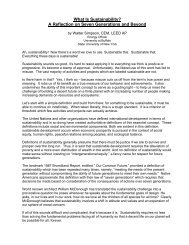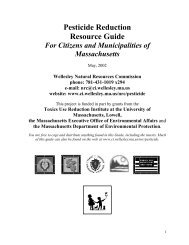Business Guide to Paper Reduction - Tufts Office of Sustainability
Business Guide to Paper Reduction - Tufts Office of Sustainability
Business Guide to Paper Reduction - Tufts Office of Sustainability
Create successful ePaper yourself
Turn your PDF publications into a flip-book with our unique Google optimized e-Paper software.
I. Background Education About <strong>Paper</strong> Use<br />
A. Trends in <strong>Paper</strong> Consumption<br />
As many people who work in an <strong>of</strong>fice can attest, paper is ubiqui<strong>to</strong>us. While buried under piles<br />
<strong>of</strong> memos, reports, <strong>to</strong>-do lists, order forms, and staff manuals, paper’s services seem<br />
indispensable, yet the paper itself seems <strong>to</strong> be a great burden. Quite likely, both impressions are<br />
true.<br />
The ability <strong>to</strong> document processes, place or fill orders, manage human resources, communicate<br />
between employees, s<strong>to</strong>re information, edit documents, bill cus<strong>to</strong>mers, and legally protect<br />
oneself or the company can be the core <strong>of</strong> business operations. His<strong>to</strong>rically, providing these<br />
services required the use <strong>of</strong> paper. Without this important <strong>to</strong>ol, it would be very difficult <strong>to</strong><br />
conduct business.<br />
Yet for many <strong>of</strong> these services, there are new <strong>to</strong>ols or methods available that could replace the<br />
use <strong>of</strong> paper and provide the service more efficiently and/or cost less. As explained in the<br />
following sections, there are significant economic and environmental concerns related <strong>to</strong><br />
sustained paper dependence. To fully understand these concerns, it is important <strong>to</strong> understand the<br />
magnitude <strong>of</strong> current paper consumption:<br />
<strong>Paper</strong> Consumption Statistics<br />
• The average American <strong>of</strong>fice worker is estimated <strong>to</strong> use a sheet <strong>of</strong> paper every 12<br />
minutes—a ream per person every two and a half working weeks—and <strong>to</strong> dispose <strong>of</strong><br />
100-200 pounds <strong>of</strong> paper every year. 3<br />
• The number <strong>of</strong> pages consumed in U.S. <strong>of</strong>fices is growing by about 20 percent each<br />
year. 4<br />
• The introduction <strong>of</strong> email in<strong>to</strong> an organization resulted on average in a 40 percent<br />
increase in paper consumption. 5 A worldwide growth <strong>of</strong> 600 percent in printer<br />
accessibility between 1988 and 1993 6 is in part what contributes <strong>to</strong> this.<br />
• The U.S. is by far the world’s largest producer and consumer <strong>of</strong> paper. 7 Per capita<br />
U.S. paper consumption is over six times greater than the world average and about 25<br />
percent greater than Japan, the world’s second largest per capita paper consumer. 8<br />
• According <strong>to</strong> the Food and Agriculture Organization, global paper products<br />
consumption has tripled over the past three decades and is expected <strong>to</strong> grow by half<br />
again before 2010. 9<br />
This report focuses on ways <strong>to</strong> improve business efficiency by reducing paper use. Many <strong>of</strong> the<br />
suggestions for paper reduction entail investing in new technology. 10 While some <strong>of</strong> the<br />
information above indicates that introducing more technology—such as the internet or printers—<br />
in<strong>to</strong> the workplace can result in increased paper use, this is not the only possible outcome. As<br />
documented throughout this report, numerous companies have had excellent success in reducing<br />
<strong>Business</strong> <strong>Guide</strong> <strong>to</strong> <strong>Paper</strong> <strong>Reduction</strong> 2







